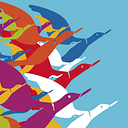Why is Gaia Education necessary?
Excerpt from the Ecovillage Design Education Curriculum
“We are not a collection of objects but a communion of subjects…we must reinvent ourselves at a species level”
– Thomas Berry
It is widely known that humanity faces an unprecedented crisis of global proportions that threatens our viability and future sustainability on this planet. In many parts of the planet, we are suffering from the consequences of using up the natural resources at a far higher rate than they can be replenished. The production of many essential biological and physical resources has already peaked. Forests, fisheries, and coral reefs are damaged and disappearing, soils are impoverished by over-cropping and the use of chemicals; diversity is reduced by genetic manipulation. The reserves of freshwater are diminishing and today more than half the world’s population faces water shortages.
Over and above, climate change threatens to make a large extension of the planet unsuited for food production and habitation. Already, changing weather patterns are creating drought, devastating storms, widespread harvest failures, and rising sea levels that flood coastal cities and lands. And now, looming on the horizon is “peak oil,” with its coming adjustments and retrofits, including the probability of ongoing conflict over access to the remaining fossil energy reserves.
All these problems are well documented but gaining awareness of the extent of the problems is only half the task of becoming educated these days. The other half is acquiring the practical skills, analytic abilities and philosophical depth to remake our human presence in the world. Without appropriate skills and training, we may not be able to deal in time with the complex interwoven, trans-disciplinary issues involved in the redesign of our lifestyles and in the transition of our communities and societies.
Our view is that all the above problems originate from a worldview of separation, fragmentation and reductionism and that only systemic approaches are likely to address the new generation of global survival problems; carried out in a true spirit of global solidarity and connectivity that recognizes that a culture of peace, localization and sustainability is the only viable path forward.
Within this crisis, a unique opportunity is also to be found. For if the challenge is so complex, the possibilities are equally comprehensive. A comprehensive change of consciousness is emerging within the human community, that may free us from the reductionist and materialistic worldview that has dominated the last few centuries. We are beginning to recognize the social virtues of frugality, simplicity and a sense of oneness.
Remembering Einstein, we cannot solve problems with the same mindset that created them. In the language of spiral dynamics, we need to move from the first to the second tier. We need to raise our consciousness several rounds in the evolutionary spiral. In short, we need a worldview, vision and values that are aligned with collaborative action.
The World Wisdom Council convened by the Club of Budapest affirms: “Neither breakdown in chaos nor breakthrough to a new civilization is fated. The future is not to be foretold, it is to be created.
Every human being endowed with consciousness can decisively form it. There are workable alternatives to the way we do things in the world today that could help us deflect the trends that move us toward crisis and pave the way toward a more sustainable and peaceful new civilization.” Is it possible, therefore to create a lifestyle that builds on a worldview of oneness among all life forms and reduces energy consumption by 80–90% in the Global North? Is it possible to keep the global temperature increase below the critical 2 degrees Celsius and still make room for improving living conditions in the Global South? Is it possible to find a path to globally change the social, economic and political structures at the same time as we transform people and reduce our numbers? The task is of unprecedented magnitude.
